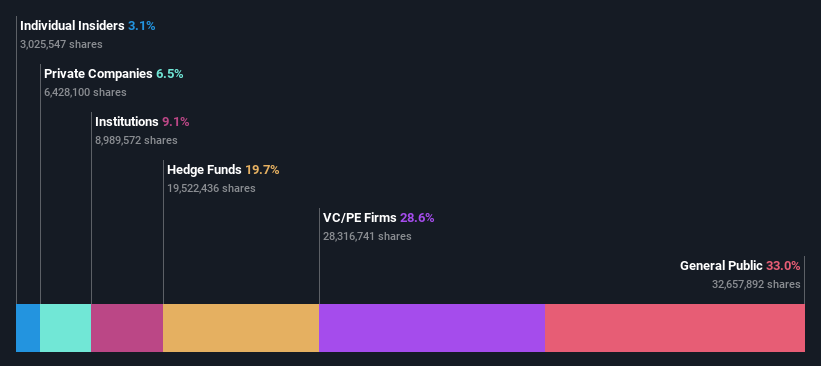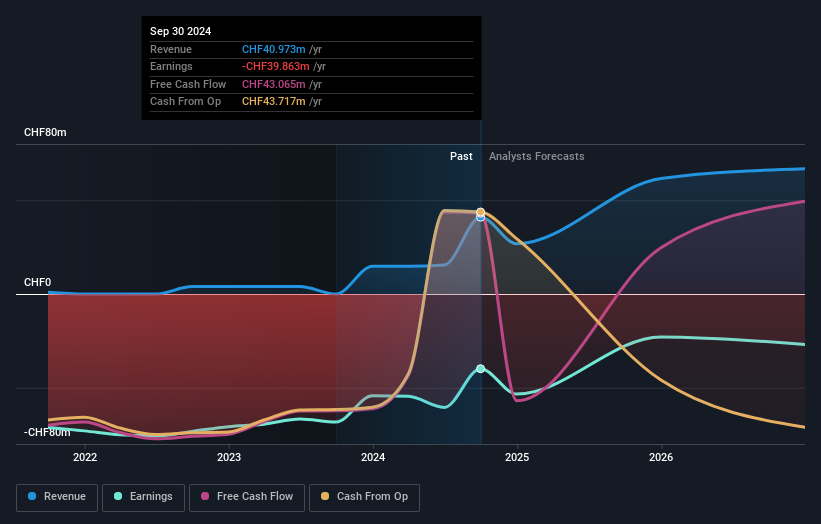- United States
- /
- Biotech
- /
- NasdaqGM:ACIU
AC Immune SA's (NASDAQ:ACIU) last week's 11% decline must have disappointed retail investors who have a significant stake

Key Insights
- The considerable ownership by retail investors in AC Immune indicates that they collectively have a greater say in management and business strategy
- The top 4 shareholders own 55% of the company
- Ownership research along with analyst forecasts data help provide a good understanding of opportunities in a stock
If you want to know who really controls AC Immune SA (NASDAQ:ACIU), then you'll have to look at the makeup of its share registry. And the group that holds the biggest piece of the pie are retail investors with 33% ownership. Put another way, the group faces the maximum upside potential (or downside risk).
And last week, retail investors endured the biggest losses as the stock fell by 11%.
In the chart below, we zoom in on the different ownership groups of AC Immune.
See our latest analysis for AC Immune

What Does The Institutional Ownership Tell Us About AC Immune?
Institutional investors commonly compare their own returns to the returns of a commonly followed index. So they generally do consider buying larger companies that are included in the relevant benchmark index.
As you can see, institutional investors have a fair amount of stake in AC Immune. This can indicate that the company has a certain degree of credibility in the investment community. However, it is best to be wary of relying on the supposed validation that comes with institutional investors. They too, get it wrong sometimes. It is not uncommon to see a big share price drop if two large institutional investors try to sell out of a stock at the same time. So it is worth checking the past earnings trajectory of AC Immune, (below). Of course, keep in mind that there are other factors to consider, too.

It looks like hedge funds own 20% of AC Immune shares. That catches my attention because hedge funds sometimes try to influence management, or bring about changes that will create near term value for shareholders. BVF Partners L.P. is currently the largest shareholder, with 20% of shares outstanding. Meanwhile, the second and third largest shareholders, hold 16% and 12%, of the shares outstanding, respectively. Additionally, the company's CEO Andrea Pfeifer directly holds 2.4% of the total shares outstanding.
Our research also brought to light the fact that roughly 55% of the company is controlled by the top 4 shareholders suggesting that these owners wield significant influence on the business.
While studying institutional ownership for a company can add value to your research, it is also a good practice to research analyst recommendations to get a deeper understand of a stock's expected performance. Quite a few analysts cover the stock, so you could look into forecast growth quite easily.
Insider Ownership Of AC Immune
The definition of company insiders can be subjective and does vary between jurisdictions. Our data reflects individual insiders, capturing board members at the very least. Management ultimately answers to the board. However, it is not uncommon for managers to be executive board members, especially if they are a founder or the CEO.
Most consider insider ownership a positive because it can indicate the board is well aligned with other shareholders. However, on some occasions too much power is concentrated within this group.
We can report that insiders do own shares in AC Immune SA. In their own names, insiders own US$8.9m worth of stock in the US$291m company. It is good to see some investment by insiders, but it might be worth checking if those insiders have been buying.
General Public Ownership
With a 33% ownership, the general public, mostly comprising of individual investors, have some degree of sway over AC Immune. While this size of ownership may not be enough to sway a policy decision in their favour, they can still make a collective impact on company policies.
Private Equity Ownership
Private equity firms hold a 29% stake in AC Immune. This suggests they can be influential in key policy decisions. Some investors might be encouraged by this, since private equity are sometimes able to encourage strategies that help the market see the value in the company. Alternatively, those holders might be exiting the investment after taking it public.
Private Company Ownership
It seems that Private Companies own 6.5%, of the AC Immune stock. It might be worth looking deeper into this. If related parties, such as insiders, have an interest in one of these private companies, that should be disclosed in the annual report. Private companies may also have a strategic interest in the company.
Next Steps:
I find it very interesting to look at who exactly owns a company. But to truly gain insight, we need to consider other information, too.
I like to dive deeper into how a company has performed in the past. You can access this interactive graph of past earnings, revenue and cash flow, for free.
But ultimately it is the future, not the past, that will determine how well the owners of this business will do. Therefore we think it advisable to take a look at this free report showing whether analysts are predicting a brighter future.
NB: Figures in this article are calculated using data from the last twelve months, which refer to the 12-month period ending on the last date of the month the financial statement is dated. This may not be consistent with full year annual report figures.
New: Manage All Your Stock Portfolios in One Place
We've created the ultimate portfolio companion for stock investors, and it's free.
• Connect an unlimited number of Portfolios and see your total in one currency
• Be alerted to new Warning Signs or Risks via email or mobile
• Track the Fair Value of your stocks
Have feedback on this article? Concerned about the content? Get in touch with us directly. Alternatively, email editorial-team (at) simplywallst.com.
This article by Simply Wall St is general in nature. We provide commentary based on historical data and analyst forecasts only using an unbiased methodology and our articles are not intended to be financial advice. It does not constitute a recommendation to buy or sell any stock, and does not take account of your objectives, or your financial situation. We aim to bring you long-term focused analysis driven by fundamental data. Note that our analysis may not factor in the latest price-sensitive company announcements or qualitative material. Simply Wall St has no position in any stocks mentioned.
About NasdaqGM:ACIU
AC Immune
A clinical stage biopharmaceutical company, discovers, designs, and develops medicines and diagnostic products for the prevention and treatment of neurodegenerative diseases associated with protein misfolding.
Flawless balance sheet with high growth potential.


